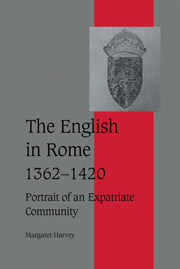Book contents
- Frontmatter
- Contents
- Acknowledgements
- List of abbreviations
- Maps
- Introduction
- 1 The setting I: Rome in the later fourteenth century, 1362–1376
- 2 The setting II: Rome, 1376–1420
- 3 S Thomas's hospice
- 4 S Chrysogonus' hospice and other enterprises
- 5 The laity in Rome
- 6 Women
- 7 The English in the curia 1378–1420: I
- 8 The English in the curia 1378–1420: II
- 9 The career of John Fraunceys
- 10 Adam Easton, an English cardinal: his career
- 11 Adam Easton's ideas and their sources
- 12 Conclusion
- Bibliography
- Index
- Cambridge Studies in Medieval Life and Thought Fourth Series
8 - The English in the curia 1378–1420: II
Published online by Cambridge University Press: 28 July 2009
- Frontmatter
- Contents
- Acknowledgements
- List of abbreviations
- Maps
- Introduction
- 1 The setting I: Rome in the later fourteenth century, 1362–1376
- 2 The setting II: Rome, 1376–1420
- 3 S Thomas's hospice
- 4 S Chrysogonus' hospice and other enterprises
- 5 The laity in Rome
- 6 Women
- 7 The English in the curia 1378–1420: I
- 8 The English in the curia 1378–1420: II
- 9 The career of John Fraunceys
- 10 Adam Easton, an English cardinal: his career
- 11 Adam Easton's ideas and their sources
- 12 Conclusion
- Bibliography
- Index
- Cambridge Studies in Medieval Life and Thought Fourth Series
Summary
Abbreviators were responsible for drawing up and ensuring the legal correctness of draft letters. Their role was evolving and in the course of the fifteenth century they became divided into upper and lower ranks. But the division was not so apparent for those described below. I have found nine English abbreviators during this period, here listed with their known period of office: John Fraunceys (1380–1413), Richard Holme (1386–?97), William Tart (1394), John Swayne (1404–11), William Lovell (1401–10), John Teyr (1400–c. 1405), Henry Gardiner (1400), John Haget (1406–12) and Thomas Polton (1401–14).
The careers of most are clear enough. They were probably all lawyers with degrees known for certain in some cases. Holme was bachelor of civil law by 1397 and doctor by 1406. His legacy of books to Cambridge was from a ‘licentiate of both laws’, so he must also have had canon law training. Swayne was a doctor of both laws; by 1408 he was calling himself rector of the university of Sienna. Haget was bachelor of canon law by 1405 and finally doctor of civil law. Polton was bachelor of canon law by 1388 and of both laws by 1402. Lovell was bachelor of civil law by 1400. The qualifications of Teyr and Gardiner are unknown.
Almost all can be traced first as proctors; this is true of Holme, Swayne, Lovell, Teyr, Gardiner and Haget. Richard Holme was undoubtedly supported by the king.
- Type
- Chapter
- Information
- The English in Rome, 1362–1420Portrait of an Expatriate Community, pp. 149 - 173Publisher: Cambridge University PressPrint publication year: 2000



